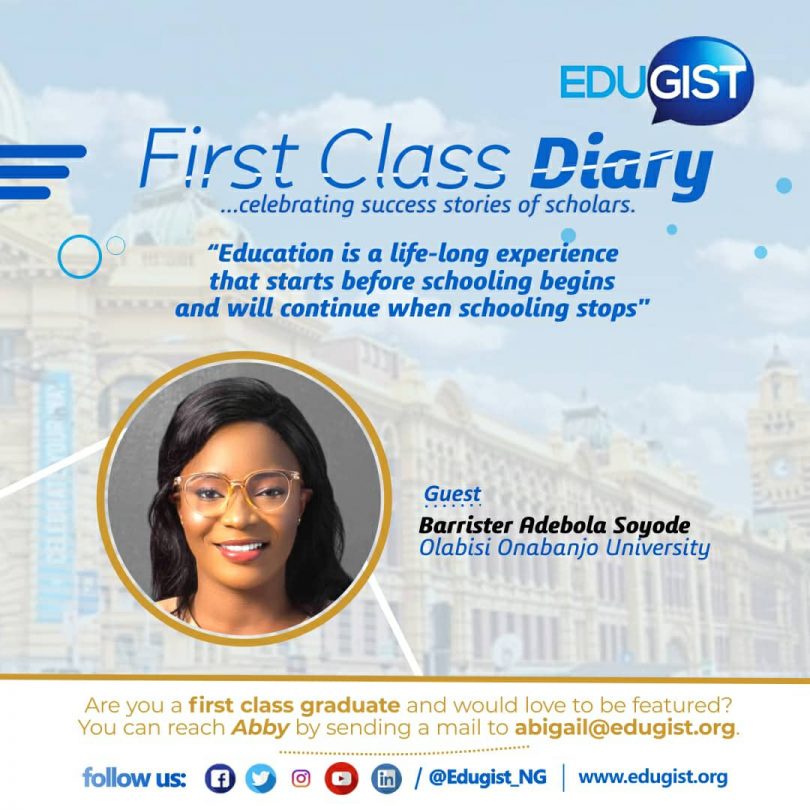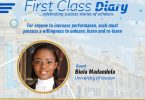First Class Diary: Education is a Lifelong Experience – AO
Hi everyone! It’s the last series in July and you can be sure that it’s an exciting episode on the series again. I have got an interesting interview for you.
This time, my guest is all the way from Olabisi Onabanjo University. Please meet, Barrister Adebola Soyode. Let me save the rest of the story.
In her words,
Education is a life-long experience that starts before schooling begins and will continue when schooling stops
Enjoy!
Abigael Ibikunle of Edugist: Please share with Edugist, a little about your background.
Adebola Olabisi: My name is Adebola Olabisi Soyode. I hail from Abeokuta, Ogun State but most of my preliminary education was in Oyo State.
Completed my nursery and primary education at Shalom Kiddies College, Ibadan, Oyo State. Then, I proceeded to St. Teresa’s College for my Junior and Senior Secondary education.
I have always been a smart chap right from my early years. Memories of my childhood resonate around leading my class or being among the top three right from nursery to secondary school.
At some point, during my junior school years, I got so playful that I was not serious with my studies anymore.
Yet, I could still easily secure a good position among the top, maybe not just among the first three.
I completed my law course at Olabisi Onabanjo University, Ogun State (OOU) as the 4th Best Graduating Student of the 2017/18 Class.
After which I proceeded to the Nigerian Law School, where I graduated with a 1st Class and received the Director General’s Prize for First Class Students.

Barrister Debola Soyode
I was also awarded the Chief Richard Akinjide SAN’s Prize for 2nd Overall Best Student in Civil Litigation for the 2018/19 Academic Session.
AI: Was there any motivating factor(s) that influenced your choice of discipline and institution?
AO: Regarding my choice of institution and discipline, it was simply an act of Providence. This is because the only memory I have regarding this, was my mom convincing me to study law.
According to her, it would make me the first lawyer in my maternal and paternal family. When I was much younger, everyone knew I wanted to be a Journalist because I loved reading and being on TV.
My inspiration then was Seun Olagunju on NTA news. I felt Journalism sounded bigger than Newscasting, so I wanted to combine the two. However, I bought my mom’s ‘supposed’’ idea and I changed the course when applying for JAMB.
Shockingly and interestingly, two years after graduating from the University, my mom does not seem to remember that conversation. She was completely fazed when I raised the issue, and said I simply changed my mind all of a sudden.
As to institution, I initially applied to University of Ibadan but my total score was 4 marks less than the cut-off mark for law. I had to apply to OOU and having passed the POST-UTME, I got admitted to study law.
AI: There are two major skills that every student must possess: COMPETENCE and PERFORMANCE. While competence revolves around skill acquisition, performance is much more concerned about skills application. It is believed that most graduates are competent because their academic performance testifies to this, but they are performance-challenged. This poor performance ipso facto hinders them from getting lucrative jobs in the labour market. What can you say about this assertion?
AO: It is without doubt that Nigerian schools do not teach students with performance or skill application in view. However, I believe strongly in Personal Development.
It is dangerous for students to relinquish that aspect of their lives to an institution. And I think that’s where the problem lies.
No university would stop you from taking certifications, internships, etc in your area of interest or field of study. These would give you an opportunity to apply the skills you are acquiring as a student in school.
You also tend to network and easily decide what particular career path you want to tread in the nearest future as a graduate.
Students should learn to stop complaining and take personal responsibility for their career growth. A certificate is not more than a certificate.
Our educational system is the way it is, but students can be better than what they are and better prepared for the labour market.
AI: What do you think is responsible for competence without performance? Please suggest ways of improving the performance level of university students and graduates.
AO: If I am to address the problem from the root, then Nigerian educational curriculum should amended to fit into international best practices. Howbeit, still localised to make it much more practicable and efficient.
That being said, students should take more responsibility for their education as mentioned above.
Education is a life-long experience that starts before schooling begins and will continue when schooling stops.
This attitude will help students to seek opportunities to learn much more beyond lectures. Also, it will help build them in areas necessary for their professional and career growth.
AI: Achievement in life transcends one’s personal efforts. There were people who, during your programme, rendered some assistance that made your dreams a reality. Who are specific persons whose contribution you can’t forget in your first-class feat?
AO: There are so many people God has used to guide and provide me support right from my early years. The list is rather a long one. God is my major inspiration. He supplies the strength and unflinching drive for excellence.
Also, I am indebted to my dad and mom, Mr. and Mrs Soyode. They are simply the best support system I could have ever asked for. My sister, Olusola Soyode, brother, Olasubomi Soyode, Prof. Afolabi Soyode.
Mrs Olajumoke Sonubi and the Household of Faith, Bola Badejo, Othniel Falana, Muyiwa Odubela, Priscilla Adebayo. Adedamola Otuyalo, Damilola Awotula, Ikokwu Jennifer, Mr Rasheed Adefala, Yahaya Taofeek, to mention but a few.
I’m grateful to God for the gift of selfless family and friends.
AI: As a first-class graduate, are you currently gainfully employed?
AO: Yes. I am an Associate at SimmonsCooper Partners, a leading and full-service law firm in Victoria Island, Lagos, although as a Youth Corper.
AI: Do you think your grades have or is giving you any major advantage over other graduates with lesser grades?
AO: Well, yes. However, grades on its own do not usually give law graduates any advantage over others.
Sometimes, how strategically positioned you are and your practical exposure to law practice determines your advantage over other lawyers. Not just grades. Although, grade is a major constituent.
AI: For students who aspire to graduate with outstanding grade like yours, what would you advise them?
AO: As I often say,
the only feat which is impossible is that which you deem impossible. Regardless of your past academic record, if you set your mind to achieve something, you can achieve it.
If you do not achieve it, don’t blame it on Providence, neither is it the fault of the lecturer or your colleagues. It’s your fault.
Raise the bar, stop ‘lazying’ around. Prepare for your future and career right from your student days. That, to me is wisdom. Set high and achievable goals every semester. Work hard towards it, pray hard and you’ll definitely achieve it.
Also, read beyond course schedules, read wide, acquire certifications both nationally and internationally, take up internships both locally and globally, compete with students from other schools.
Be aware of what is going on out there especially in your field of study or interest, the virtual space gives access to these things. Give yourself to personal development and you’ll be glad you did.
AI: What would you advise the government to do to improve the standard of our education system?
AO: Teachers at all levels should be handsomely remunerated. This will motivate them to put in their best in the discharge of their duties. Also, students should be exposed to the practical aspect of their studies.
The educational curriculum is too defective and obsolete to adequately equip students for the 21st century. It should be reviewed and upgraded to align with recent developments in the world of reality.
AI: Any other thing you would like to share?
AO: Yes! Gunning for excellent grades and smashing the records is a good thing. It’s just as good as aiming high and attaining financial excellence.
However, it is more fulfilling, and rewarding if all these feats are perceived as a platform that gives one an opportunity to impact more people and be a blessing to many.
In the words of a great man, ‘in the end, what matters is not your power, wealth or influence but what you do with what you have- that is your legacy”. Thank you Edugist for this privilege. Keep making impact!
That’s it for this week’s episode. I hope you enjoyed the interview. Got a scholar you would love to be featured?
Would you like to sponsor any of our scholars you find their stories inspiring?
Or want to contact any of them for engagements? Please reach out to me
I am Abigael Ibikunle and celebrating excellence is a top priority for me. iTeach, iSpeak, iTrain, iFacilitate, iWrite, iInterview and iLoveYou all. Smile! See you next week!









[…] Hi everyone! It’s August! Yaaaaaay, I’m excited. It’s another exciting episode on the series again. I have got an interesting interview for you. If you missed July series, read up here. […]